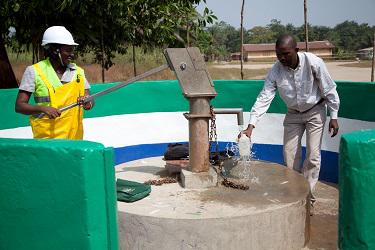
It’s been more than a decade since the students at the Harry C Primary school in Masorie, Sierra Leone, were able to drink from the well on school grounds. Now a UNICEF-supported rehabilitation project is bringing clean water back to schoolchildren and villagers in the community.
As Rosemarie Yema Blake pushed down on the water pump, a government technician held a plastic bottle under the spout to collect a sample from the gushing stream. Ms. Blake is an engineer from UNICEF’s NGO partner Living Water, and her most recent project brought her to an abandoned well at the Harry C Primary school in Sierra Leone’s Western Rural district. Students waited in anticipation to learn if, for the first time in more than a decade, the well would produce clean water.
“The water was not good to drink before – it was corrosive and had metallic content,” said Earnest Joko Henry, head teacher at the school. “The well had lots of debris in it. And the people here said that rebels had been killed and thrown in the water during the war, so they refused to drink it.”
The well had remained unused by the school and the villagers since Sierra Leone’s Civil War, which lasted from 1991-2002. Instead, students ventured to another well outside the school compound – a journey that cut into their class time.
“When the children came to school, they had to go and fetch water to fill all the buckets for hand washing, which meant they only started their school day at about ten,” said Mr. Henry.
Clean water returns
With support from UNICEF, the well and pump at the school were recently rehabilitated. The final step in the rehabilitation process is testing the water, and the technicians confirmed that it was safe for the community to use, including for drinking. With one final chlorination, the well got the all-clear.
“This is the only deep well in the community that doesn’t dry up during the dry season,” said Mr. Henry. “There are about 450 people living in this and the surrounding two villages and they all depend on this well. We are therefore very happy that it has been rehabilitated.”
And from now on, students at the school no longer have to leave the school compound to get water.
“Every morning we clean the pump and area around the well,” said 12-year-old Ali Kabia, the president of the school’s Child Health Club. The club works together with the School Management Committee to manage water, sanitation and hygiene (WASH) at the school. “The water from the well is good now, so we are not afraid to use it and we are happy for that.”
Disease prevention
Since the rehabilitation, it has also become much easier for students to do the routine hand-washing that is part of the infection prevention and control procedures set up during the recent Ebola outbreak.
“We wash the buckets and get water to wash the class and for hand-washing,” said 12-year-old Zeyneb Koromah, Ali’s deputy in the club. “We fill the handwashing buckets and make sure all children wash their hands with soap. And then we check their temperature before they can enter the class. We have good toilets for boys and girls, and separate ones for the teachers. We take turns scrubbing the toilets and making sure they stay clean.”
In Sierra Leone, only 63 per cent of the population has access to safe drinking water. Improved sanitation facility coverage is even lower at 13 per cent. Having adequate water and sanitation facilities in schools is critical for ensuring a conducive learning environment for students, but only 23 per cent of schools have a functioning water supply.
UNICEF is supporting the rehabilitation of water supply systems in 170 schools and 84 health facilities in eight districts in Sierra Leone as part of its support to the Government’s post-Ebola recovery programme.
Source: UNICEF
 FR
FR EN
EN AR
AR








